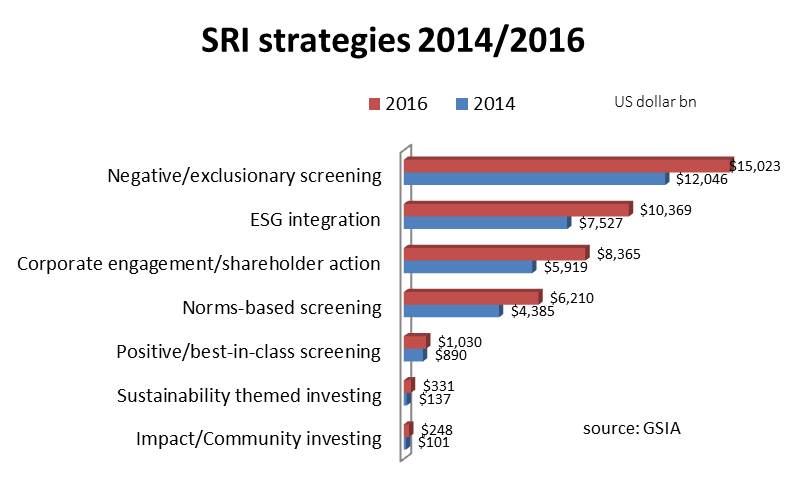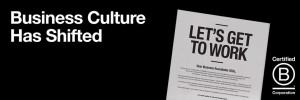 On August 19th, 2019 the Business Roundtable (the association of CEOs of America’s leading companies) released a new Statement on the Purpose of a Corporation. This new statement was signed by 181 CEOs who commit to lead their companies for the benefit of all stakeholders-customers, employees, suppliers, communities and stakeholders. This is a significant move away from their stance since 1978 as principles issued until now endorsed shareholder primacy (that corporations exist principally to serve shareholders).
On August 19th, 2019 the Business Roundtable (the association of CEOs of America’s leading companies) released a new Statement on the Purpose of a Corporation. This new statement was signed by 181 CEOs who commit to lead their companies for the benefit of all stakeholders-customers, employees, suppliers, communities and stakeholders. This is a significant move away from their stance since 1978 as principles issued until now endorsed shareholder primacy (that corporations exist principally to serve shareholders).
The long-awaited paradigm shift! Or shall we be sceptical that these changes will be implemented?
In the days following this announcement, we have seen debates shaping and many cautionary but constructive articles being published. There was an immediate critical response announced by the Council of Institutional Investors raising outdated concerns that the statement undercuts notions of managerial accountability to shareholders. The B Corporation movement founders, who have been in the forefront of redefining the role of businesses into one that delivers value to all stakeholders, published an excellent article “Don’t Believe the Business Roundtable has changed until the CEOs’ action match their words” This title sounds a bit harsh but it is important to hold the CEOs accountable and a full-page ad “Let’s get to work” was posted in the Sunday New York Times urging them to get to work (together).
In addition to the B Corporation movement, there has been in the past few years some signs of this impending paradigm shift as witnessed by the letters to the CEOs written by Larry Fink, CEO of BlackRock “linking purpose and profits”. Another powerful movement that is growing is lead by Singularity University which is shaping leaders and organizations by using exponential technologies to tackle the world’s biggest challenges and build a better future for all. This latest statement by the Business Roundtable is a gigantic step forward and although it might take some time until their action matches their words, slowly but surely we are getting aligned and moving in the right direction. No turning back.
Category Archives: sustainability
What does sustainable investments, ESGs, SDGs and impact investments mean?
Sustainable investing, SRI, impact investing, Sustainable Development Goals (SDGs), Environmental, social and governance (ESG) criteria are words that we are exposed daily as it is used by investors, banks, asset managers, corporations, consultants as well as the media. It is great that this movement is mainstreaming, however, how can we make sense of figures like $23 trillion in SRI assets on one hand and a much smaller figure of $144bn in impact investment assets? It is important to understand the differences so that we can compare apples with apples and gain clarity on this growth area. This article uses the definitions by the two resources that are most established in this area; the Global Sustainable Investment Alliance (GSIA) and the Global Impact Investment Network(GIIN)
Sustainable investing is an approach to investment where environmental, social or governance (ESG) factors, in combination with financial considerations, guide the selection and management of investments.
Sustainable investing is the umbrella term that incorporates social responsible investing, SRI, impact investing and it encompasses the different strategies/activities. According to GSIA, global SRI assets in early 2016 reached $22.89 trillion, a growth of 25% compared to 2014. The strategies and activities under sustainable investments are shown below.
THe top 3 strategies; negative and exclusionary screening (15 tn), ESG integration (10.3 tn) and corporate engagement/shareholder action (8.3 tn) are very large established strategies while impact/community investment (248 bn) and sustainability themed investing (331 bn) are growing fast but still very small.
ESG (Environmental, social and governance) refers to sustainable investment criteria used alongside traditional financial criteria in managing and selecting investments. ESG is a criterion, the word is also used as ESG factors, ESG metrics and ESG integration, which is one of the largest strategies within sustainable investments.
The use of ESG by institutional investors has been rising over the past 15 years as a result of increasing evidence that integrating ESG factors in the investment process can actually improve the risk/reward of investment portfolios.
Impact Investments – Investments made into companies, organizations and funds with the intention to generate social and environmental impact alongside a financial return (source: GIIN)
Impact investment is an approach to investments and is a fast growing but the smallest subset and strategy within sustainable investments. The differentiator of this approach is the intentionality to generate positive social and environmental impact and the commitment to measure it. In terms of market size there are two benchmarks: 1) GIIN’s $144bn based on their annual survey of assets aggregated by their respondents in 2017, and 2) GSIA 2016 Review which shows the assets of the category Impact and Community investments at $248bn.
Sustainable Development Goals (SDGs)
The SDGs, a set of 17 goals was adopted in Sept 2015 by the UN “to end poverty, protect the planet and ensure prosperity for all “. The goals have specific targets to be achieved by 2030. The development of indicators and monitoring framework for the SDGs which followed has attracted many investors and asset managers to commit to invest in these goals. The SDGs are now being adopted as a framework in many of the sustainable investment strategies including impact investment funds.
Barefoot College’s evolution and the launch of Bindi Solar, a commercial solar product line
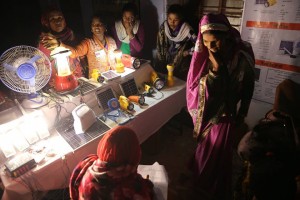 Barefoot College (BC), a not for profit, social innovation organization announced in early November the launch of Bindi Solar, the first global line of solar home lighting products fabricated, distributed, sold, installed, maintained and repaired exclusively by women. Bindi Solar products include; low cost solar home lighting systems, portable lanterns, micro grids, DC TVs and fans as well as a range of handheld solar lighting devices. Starting in India, Bindi Solar will be distributed through BC’s ground breaking partnerships with Frontier Markets and GHE as well as the Barefoot Solar Mamas trained across 15 states. Development of the new products has been made possible through the CSR collaborations with Apple, Goldman Sachs, the Phillipps Foundation and working in partnership with The Frey Charitable Foundation and EROL Foundation.
Barefoot College (BC), a not for profit, social innovation organization announced in early November the launch of Bindi Solar, the first global line of solar home lighting products fabricated, distributed, sold, installed, maintained and repaired exclusively by women. Bindi Solar products include; low cost solar home lighting systems, portable lanterns, micro grids, DC TVs and fans as well as a range of handheld solar lighting devices. Starting in India, Bindi Solar will be distributed through BC’s ground breaking partnerships with Frontier Markets and GHE as well as the Barefoot Solar Mamas trained across 15 states. Development of the new products has been made possible through the CSR collaborations with Apple, Goldman Sachs, the Phillipps Foundation and working in partnership with The Frey Charitable Foundation and EROL Foundation.
Over the past 5 years there has been a powerful yet smooth transformation at this pioneering and innovative 45 year old organization that has been providing basic services and solutions to the challenges facing rural poor communities with the objective of making them self-sufficient and sustainable, valuing and respecting the knowledge and wisdom they already possess. BC was founded in 1972 by Sanjit “Bunker” Roy, following the life and work style of Mahatma Gandhi. Today, BC boasts a diverse and inclusive team of dedicated individuals from both formally educated and grass roots communities, working side by side towards impact of the critical issues facing rural poor communities in access to energy, water, sanitation, education and sustainable livelihood development. It is an exceptional example of decentralized management philosophy, capacity building from within to deliver what has become know globally as the “Barefoot Approach” to community development.
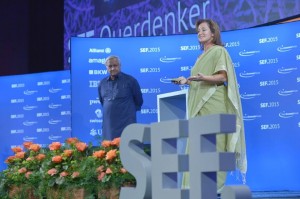 BC has been committed to empowering women as change agents, entrepreneurs and environmental stewards. Believing that placing women at the heart of the development process is the most reliable and effective way to pass on the wisdom, knowledge and skills that all rural poor communities already possess and which are so often undervalued and under utilized. BC engages in building confidence and competence in individuals and entire communities bringing about large-scale shifts in values and sustainable quality of life enhancement. BC is one of the few Indian organizations that has successfully exported its models for development across the Global South through a unique and visionary partnership with the Government of India, Ministry of External Affairs ITEC program. This partnership has resulted in true “Made in India” technology by and for the rural poor reaching 78 countries in the developing world.
BC has been committed to empowering women as change agents, entrepreneurs and environmental stewards. Believing that placing women at the heart of the development process is the most reliable and effective way to pass on the wisdom, knowledge and skills that all rural poor communities already possess and which are so often undervalued and under utilized. BC engages in building confidence and competence in individuals and entire communities bringing about large-scale shifts in values and sustainable quality of life enhancement. BC is one of the few Indian organizations that has successfully exported its models for development across the Global South through a unique and visionary partnership with the Government of India, Ministry of External Affairs ITEC program. This partnership has resulted in true “Made in India” technology by and for the rural poor reaching 78 countries in the developing world.
Over the past few years this successful organization embarked to scale exponentially its operations in both depth and breadth. This launch of Bindi Solar is only one such example. The powerful yet smooth transformation seen so far is thanks to the amazing team work of Meagan Fallone, CEO together with Bunker and the awesome team of Barefoot College. BC is embracing the latest technologies and ways to work with it, embracing diversity and inclusion while maintaining the core values.
Disclaimer: source of the content of this article: press release by barefootcollege.org, photos from barefootcollege facebook page
the author is a board member of Barefoot College International as well as The Frey Charitable Foundation
Skoll World Forum 2017 Fault Lines: Creating Common Ground
The 14th Skoll World Forum on Social Entrepreneurship took place on April 4-7. This year’s theme was Fault Lines: Creating Common Ground. As boldly described in their welcome message;
Globally, rifts are emerging along cultural, class, and political lines as globalization and the digital revolution have benefited some, and left some behind. The divide grows in how people perceive-and experience-the world which represents a threat to a peaceful and prosperous future. Can we design a world where our common humanity outshines our ideological, cultural, and political differences? Together we’ll rise to new ideas, new perspectives, and ultimately, new relationships built on trust and a mutual desire for human progress. We’ll highlight innovators around the world creating common ground through their drive, creativity and leadership.
It was not only an inspiring forum but a very rich and powerful gathering with bold and innovative ideas and exchanges happening, one of the best that I have attended in the past 11 years.
Highly recommended videos to watch… and if you would like to see more here is the entire playlist.
-Jeff Skoll talks with Jim Kim, President of World Bank Group (29min)
-Jess Search talks to Hamdi Ulukaya, Founder and CEO of Chobani (22min)
-A chilling and fascinating analysis by Michael Porter of HBS on what is the problem in the USA: Porter on Populism (90min)
Meet the Skoll Awardees of 2017 (link includes a 5 min intro to all 4 Awardees)
-Kola Masha: Babban Gona is an investor-owned social enterprise serving networks of smallholder farmers in Nigeria with a model created specifically to attract youth. The first for-profit company to receive the Skoll Award
-Elizabeth Hauser: Build Change trains homeowners, local builders, engineers, and government officials to construct or retrofit disaster-resistant houses and schools in emerging nations vulnerable to earthquakes and typhoons.
-Rajesh Panjabi: Last Mile Health partners with government to deploy, support, and manage networks of community health professionals and to integrate them into the public health system. Working in Liberia.
-Bradley Myles: Polaris systematically disrupts human trafficking networks and restores freedom to survivors. With experience and expertise from direct victim services such as hotlines and resource centers, to policy advocacy, Polaris provides a data backbone for the sector.
A big thanks to Jeff Skoll, Sally Osberg, Stephan Chambers, the Skoll team and the Saiid Business School for their awesome work.
Takeaways from the seif Impact Investing Congress 2017
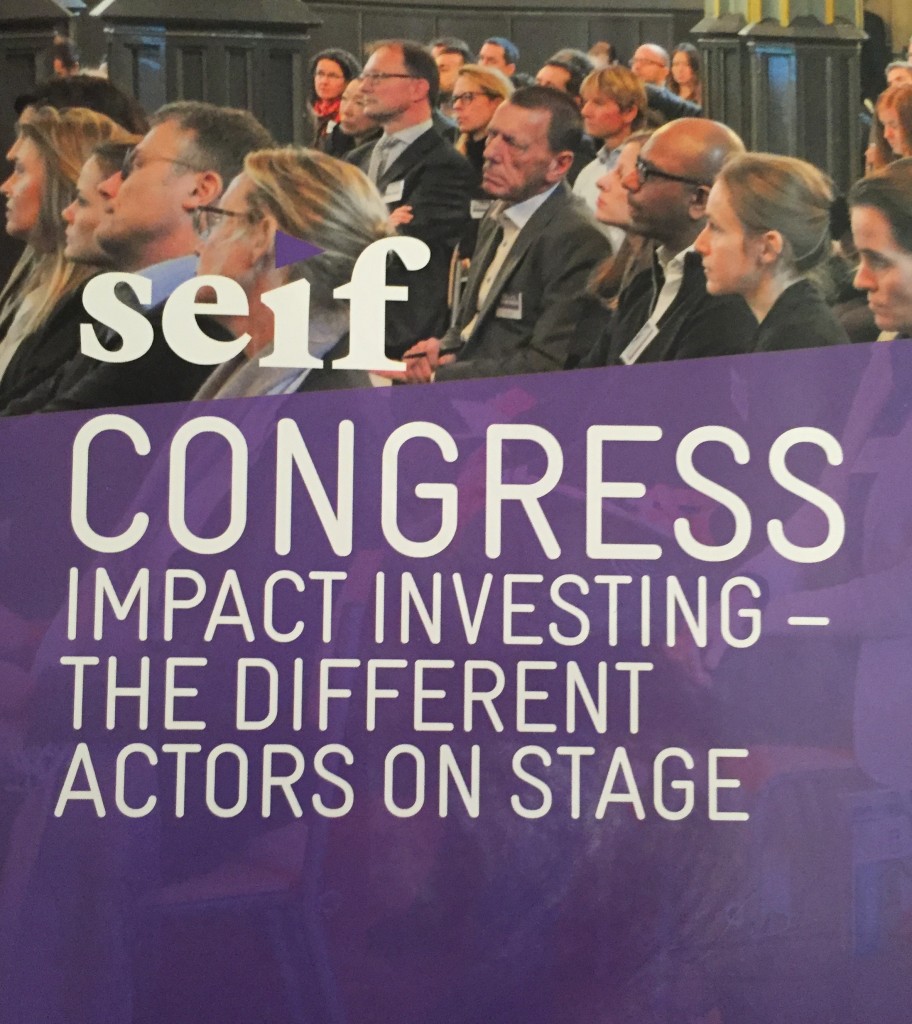 The 2nd Impact Investing Congress organized by seif took place in Zurich on Jan 24th.
The 2nd Impact Investing Congress organized by seif took place in Zurich on Jan 24th.
Some takeaways and highlights
-The space continues to grow rapidly and somewhat chaotically as new players from all segments with different aspirations and products enter and push for mainstreaming impact investment. Growth is great and as a result you can’t avoid some growing pains. Some big banks such as BBVA and Barclays are becoming more active in this field.
-Rod Schwarz, CEO of ClearlySo introduced the recently launched ClearlySo Atlas, an impact assessment solution for private equity investors and venture capital investors. Atlas asseses the impact of portfolio holdings enabling investors to map, track and report on their impact and sustainability. What is great about this tool is that it targets the mainstream investments managers/portfolios (not only the impact investments) to improve on its impact. This goes along with Rod’s and ClearlySo’s belief that we are moving from the two dimensional investment criteria (return vs risk) towards a three dimensional one adding impact as a feature to all investments.
-Antoni Ballabriga , Global Head of Responsible Business at BBVA made an impressive presentation on how this large bank has recently gone through a transformation involving 28,000 of their employees around the globe to (re)define their purpose. The bank’s purpose is now “To bring the age of opportunity to everyone” and thus their new tagline is “Creating Opportunities”. With the WHY being cleared, the WHAT and HOW follows. These opportunities will be offered through: financial products that meet individual customer needs; financial education programs; transparent, clear and responsible communication; commitment with the environment; support to entrepreneurship; and promotion of culture and science, among other initiatives in favor of society. Let’s see how the initiatives of another large financial player reshape the universe – for the time being let’s give them the benefit of doubt.
-Phyllis Costanza, CEO of UBS Optimus Foundation updated us on the positive results so far of their first Development Impact Bond, an innovative instrument which brings in new money and cross sector partnerships for development. They are working on a new DIB and hopefully many other DIBs would be launched by other institutions in the future.
-The closing was a very interesting panel that debated on the now and future of impact investments in Switzerland which gave us much hope but equally cautions as the industry grows and mainstreams with differing views on the extent of the impact (improving some things vs solving the real problems) that the organizations would like to create.
Thanks seif for organizing this productive Congress.
Prime Minister Modi meets the Solar Mamas in Tanzania trained by Barefoot College
On July 10th, Prime Minister Modi of India interacted with 40 Solar Mamas trained by Barefoot College in Tanzania. PM Modi took great interest in all the vocational and entrepreneurial activities that the Solar mamas are conducting such as solar electrification, tailoring, bee keeping and honey making. In fact he was very happy to take home some of the products like robes and honey which are now sold commercially in Zanzibar.
Barefoot College has trained solar mamas in 74 of the least developed countries. This project is done in collaboration with the Indian government. The founder Bunker Roy has lead this organization for 42 years and recently handed over the operational responsibilities to Meagan Fallone, CEO of Barefoot College International. In the last 2 years BCI has started to scale the vocational training activities by building training centers outside of India. The first such training center was launched last year in Zanzibar. 5 more training centers will be launched in Africa and a few in Latin America, Asia and South Pacific.
Congratulations Bunker, Meagan, and the whole Barefoot College team!
(disclaimer: the author is a board member of Barefoot College International)
The First European B Corp Summer Summit
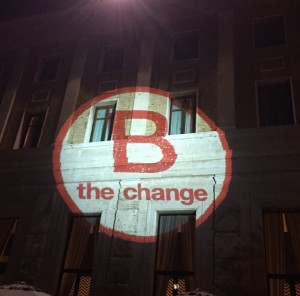
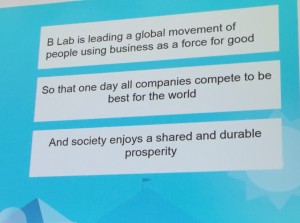
The European B Corp Summit, a celebration for People Using Business as a Force for Good, took place in Rome on June30 & July1. Two energetic days of learning, sharing, networking amongst the rapidly expanding global B Corp community (currently 1809 companies in 50 countries). The focus was on brainstorming and action planning on how can we continue to accelerate this movement. Powerful messages through numerous inspiring speakers including: Pedro Tarak of Sistema B, Lorna Davis of Danone, Thomas Van Craen of Triodos Bank, Bryan Welch of B the Change Media, Mirella Zuidgeest of thermaflex, Corey Lien of DOMI, Pablo Sepulveda & Eloisa Silva of Birus, and Christoph Barman of Loyco. Thanks to the B Lab Europe team and Nativa for organizing such an impactful event!
Skoll World Forum 2016: Fierce Compassion
The 13th Skoll World Forum on social entrepreneurship took place on April 13-15. It was my 10th Skoll and it was one of my favourite forums so far. There are many sessions that can be seen on video. This year the theme was Fierce compassion and the topics most highlighted were “climate change” and “refugee crisis”.
Highly recommended videos to watch:
Al Gore: A Climate of Change: Fueling a new future
Alexander Betts: Refugees as a Resource
Profile of the 2016 Skoll Award Recipients:
–Mallika Dutt and Sonali Khan (Breakthrough)
–Bryan Stevenson (Equal Justice Initiative)
–Chuck Slaughter (Living Goods)
–Vivek Maru (Namati)
–Oren Yakobovich (Videre)
Sessions:
–Refugee Crisis: Roots and Remedies
–Getting Beyond Business as Usual: Paving the way for social progress
The musical performances during the Forum were just awesome and inspiring starting with Malek Jandali, Syrian-American Composer and Pianist, Juanes, and Sonita Alizadeth.
The most moving performance was of Sonita, rapper and child marriage activist. The two videos Sonita’s performance and the interview that followed are the must sees of this year’s Skoll.
I would like to thank Jeff Skoll, Sally Osberg, the whole Skoll team and the University of Oxford for hosting again such an inspiring and powerful rich content forum.
Change is coming- launch of B Lab UK
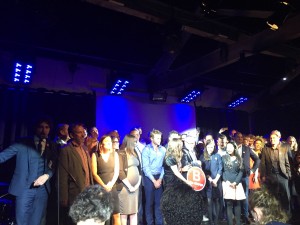
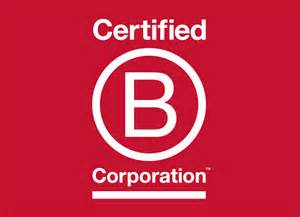
On Sept 24 B Lab UK hosted the event “Change is coming” the official launch of 62 certified UK B Corps at Proud Galleries in Camden, London. The B Corp movement is gaining momentum and now there are over 1400 companies across 42 countries that are B Corp certified and a number that is growing by the day. In this event it was inspiring to hear the founders of Bridges Ventures, COOK, Fairphone, and Streetlife talk about their businesses and their road to become B Corps. It was also a great gathering to network with the B Corp global community as many leaders were present such as Bart Houlahan, (B Lab Co-Founder), Marcello Palazzi (B Lab Europe Co-founder), and Pedro Tarak (Co-founder of Sistema B, B Corp South America).
There was also a big announcement made by Bart that B Lab is establishing a Multinationals and Public Markets (MPM) Advisory Council as of January 2016 as a strong response for the growing number of multinationals and publicly listed companies that are interested in joining the B Corp movement. In a video message delivered by Paul Polman, Unilever CEO, he announced that Unilever will participate in the MPM Advisory Council and invited others to join them to achieve a collective vision of a global economy where all businesses work to create a more shared and durable prosperity for all. Yes, change is coming!
The Blue Economy – an action plan on improving the world through sustainable development
I had the greatest pleasure to meet on May 19th Dr. Ashok Khosla, a visionary & social entrepreneur at a private event (thanks Nina!) Dr. Khosla founded Development Alternatives in 1982 to purse his dream for sustainable development. Since then he has been innovating, demonstrating, and fostering the delivery of environmentally friendly and commercially viable technologies. He is also the Chairman of TARA (Technologies and Actions for Rural Advancement). He also presented the just launched 2 new books “To Choose Our Future” which he authored and “The Blue Economy Version 2.0” by Gunther Pauli, for which he is a contributing author. Both books will soon be available to buy online. The Blue Economy is the sequel to “The Blue Economy: 10 years 100 innovations 100 million jobs” and it is a powerful movement that has only started. I recommend you to see the TED talk of Gunter Pauli and the simple intro on the concept and to find about the 100 innovations.

